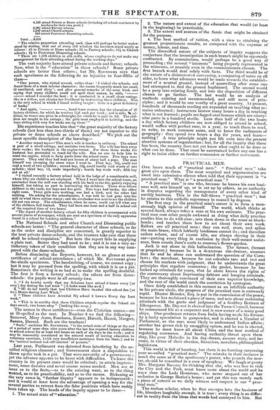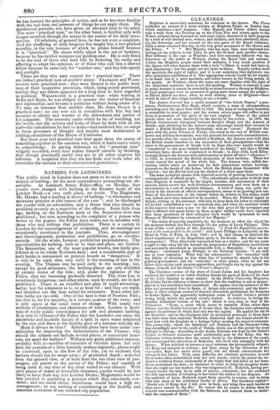PRACTICAL MEN.
ONE hears much of "practical men." " Practical men" take great airs upon them. The most sceptical and argumentative are awed into submissive silence when told that their opponent is "a practical man." What is "a practical man "?
"A practical man" is one who, because he knows his own busi- ness well, sets himself up, or is set up by others, as an authority in disputes regarding the management of every other kind of earthly business. This is the full-blown "practical man"; but he attains to this catholic supremacy in council by degrees. The first step in the practical man's career is to form a mon- strously high opinion of himself. The world, which thinks at second-hand, always takes a man at his own estimate. The prac- tical man sees other people awkward at doing what daily practice enables him to do with ease; sets them down in the mass as block-. heads; and teaches them how to set about their own work. Sailors are all practical men : they can reef, steer, and splice the main-brace, which lubberly landsmen cannot do ; and therefore sailors ashore, and of course idle, are always shoving in their oar—putting every thing in confusion by their well-meant assist- ance, from cousin Jane's curls to mamma's flower-garden. Jack is not alone in this hallucination. The farmer, (tenant or proprietor,) because he is a dexterous tile-drainer, assumes that he and he alone can understand the question of the Corn- laws ; the merchant, because he can calculate tare and tret and choose his markets with judgment, that he understands the great principles that regulate commerce ; the gaoler, because he has locked up criminals for years, that he alone knows the rights of the controversy about imprisoning debtors and hanging criminals. They are thoroughly convinced of their own superior knowledge, and the rest of the world catch the conviction by contagion. Once fairly established in this manner as an infallible authority in his private circle, the progress of the practical man is extremely rapid. Bluster Blunder, Esq. is put in the commission of the peace, because he has reclaimed a piece of moss, and sets about reclaiming criminals with the gusto and judgment of a Godfrey Bertram of' Ellengowan. Mr. Dry-rot is elected into the Town-Council, because he commenced life as a carpenter and is now owner of a many good ships. One gentleman returns from India having made his fortune by a lucky speculation in gunpowder, and is elected a Member of Parliament, as the man most likely to understand Indian affairs; another has grown rich by smuggling opium, and he too is elected, because he must know all about China and the best method of regulating commerce. And having authority thrust upon them they, like poor Malvolio in his day-dream, assume state, and be- come, in virtue of their election, financiers, moralists, philosophical legislators.
This world is full of humbug, but there is no humbug surpassing your so-called "practical men." The mistake in their instance is much the same as if the apothecary's porter, who pounds the mor- tar, should be consulted in a case of apoplexy. We laugh at pretty Mrs. Margaret Ramsay for thinking that she, who was free to visit the City and the Park, must know more about the world and its ways than the Lady Hermioue, who never stepped out of her seclusion in George Heriot's house; and yet this was merely such a piece of conceit as we daily witness and respect in our "prac- tical men."
The recluse scholar, when he first emerges into the business of life, blunders laughably enough, it is true : every thing is so differ- ent in reality from the ideas that words had conveyed to him. But
he has learned the principles of action, and as he becomes familiar with the real form and pressure of things he can apply them. His intellectual pursuits, too, have given an elevated tone to his mind. The mere "practical man," on the other hand, is familiar only with images received through the senses in the course of his daily occu- pations. Of relations, of general laws, he has not even a suspicion. And the chaffering of daily bargains has taught him a low-pitched morality, in the very lowness of which he prides himself because it is "practical:' He steers wildly about in the sea of business, because he has neither compass nor guiding-star. He is only fitted to be the tool of those who lead him by flattering his vanity and -affecting to adopt his opinions, or of those who call him a shrewd fellow because he cares only for "number one," and buy him openly and outright.
These are they who pass current for " practical men." There are indeed practical men of another stamp. FRANKLIN and WASH.. xsorox were practical men : they were formed in the public busi- ness of their respective provinces, which, being purely provincial, neither they nor others appeared for a long time to have regarded as political. Wra.nrscvox is a practical man : when warring in India and Spain, he was obliged to assume the duties of financier and diplomatist, and became a politician without being aware of it. To take an instance from another class, Mr. JOHN GULLY is a practical man : no one ever sat in committee with him but had occasion to admire and wonder at the shrewdness and justice of his judgment. The necessity under which he lay of watching, not the words, but the actions and looks of those he dealt with on the turf—the calculations he had to make—had rendered him an adept in those processes of thought and inquiry most desiderated in jobbing committees of the House of Commons. But these your real practical men bear upon them the stamp of something superior to the common run, which it hurts men's vanity to acknowledge. In paying deference to the "practical men" vulgarly so-called, every man makes himself amends by thinking, that though practically useful they are in all other respects his inferiors. A suspicion that they are but fools and tools after all, reconciles the envious to their conventional prominence.



























 Previous page
Previous page